
Best Screen Recording Software in 2025: Top 12 Tools Compared
Ever tried to explain something complex over Slack or email, only to give up and think, "I wish I could just show them"?
You carefully craft paragraph after paragraph, adding screenshots, drawing arrows... but your teammate still messages back confused. Meanwhile, what could have been a 2-minute screen recording turns into a 30-minute back-and-forth that leaves everyone frustrated.
In 2025, with 73% of professionals creating video content as part of their jobs, choosing the right screen recording software isn't just about convenience—it's about credibility, productivity, and professional presentation. The wrong choice costs more than money. It costs opportunities when watermarked videos reach clients, time when you hit recording limits mid-demo, and team efficiency when technical issues derail important presentations.
This comprehensive guide covers the best screen recording software for 2025, from free options to professional tools. We've tested each platform extensively to help you find the perfect solution for your specific needs—whether you're creating tutorials, recording meetings, or building a knowledge base.
Table of Contents
- What to Look for in Screen Recording Software
- Screen Recording Software Comparison
- The 12 Best Screen Recording Tools
- How to Choose the Right Tool
- The Future of Screen Recording
- Frequently Asked Questions
- Conclusion
What to Look for in Screen Recording Software
Before diving into our comparison of 12 top tools, let's establish what actually matters when choosing screen recording software in 2025.
Recording Capabilities
The foundation of any screen recording software is how well it captures your content. Look for tools that offer:
- Full screen vs window vs custom area recording - Flexibility to capture exactly what you need
- Webcam overlay support - Essential for personal connection in tutorials and demos
- System audio + microphone recording - Clean audio capture from all sources
- 4K/HD quality options - Professional quality that looks sharp on any display
Ease of Use
Your screen recording software should accelerate communication, not slow it down. The best tools offer:
- Quick start recording - One click to begin, no complex setup
- Intuitive interface - Clear controls that don't require a manual
- Browser-based vs desktop app - Consider your workflow and installation restrictions
- Minimal learning curve - Your team should be productive from day one
Editing Capabilities
Raw recordings rarely tell the perfect story. Built-in editing can transform good content into great content:
- Trim and cut tools - Remove mistakes and dead air
- Annotations and callouts - Highlight important elements
- Transitions and effects - Professional polish for client-facing content
- Transcript-based editing - Edit video by editing text (game-changing for efficiency)
Sharing and Collaboration
Creating videos is only half the battle—distribution matters just as much:
- Cloud hosting vs local export - Instant sharing vs full control
- Shareable links - One-click distribution to anyone
- Password protection - Security for sensitive content
- Team collaboration features - Comments, reactions, and shared libraries
Pricing and Limits
Understanding the true cost goes beyond the sticker price:
- Free tier capabilities - What can you actually accomplish without paying?
- Recording time limits - Will you hit walls during important recordings?
- Storage limits - How many videos can you keep?
- Watermarks on free plans - Can you use it professionally without paying?
Use Case Fit
Different tools excel at different tasks. Consider your primary needs:
- Tutorials and education - Need annotation tools and clear audio
- Product demos and sales - Require polish and branding options
- Internal team communication - Speed and ease matter most
- Customer support - Quick sharing and clear explanations
- Gaming and streaming - High frame rates and performance
Screen Recording Software Comparison at a Glance
Here's a quick overview of the 12 best screen recording tools we'll cover in detail:
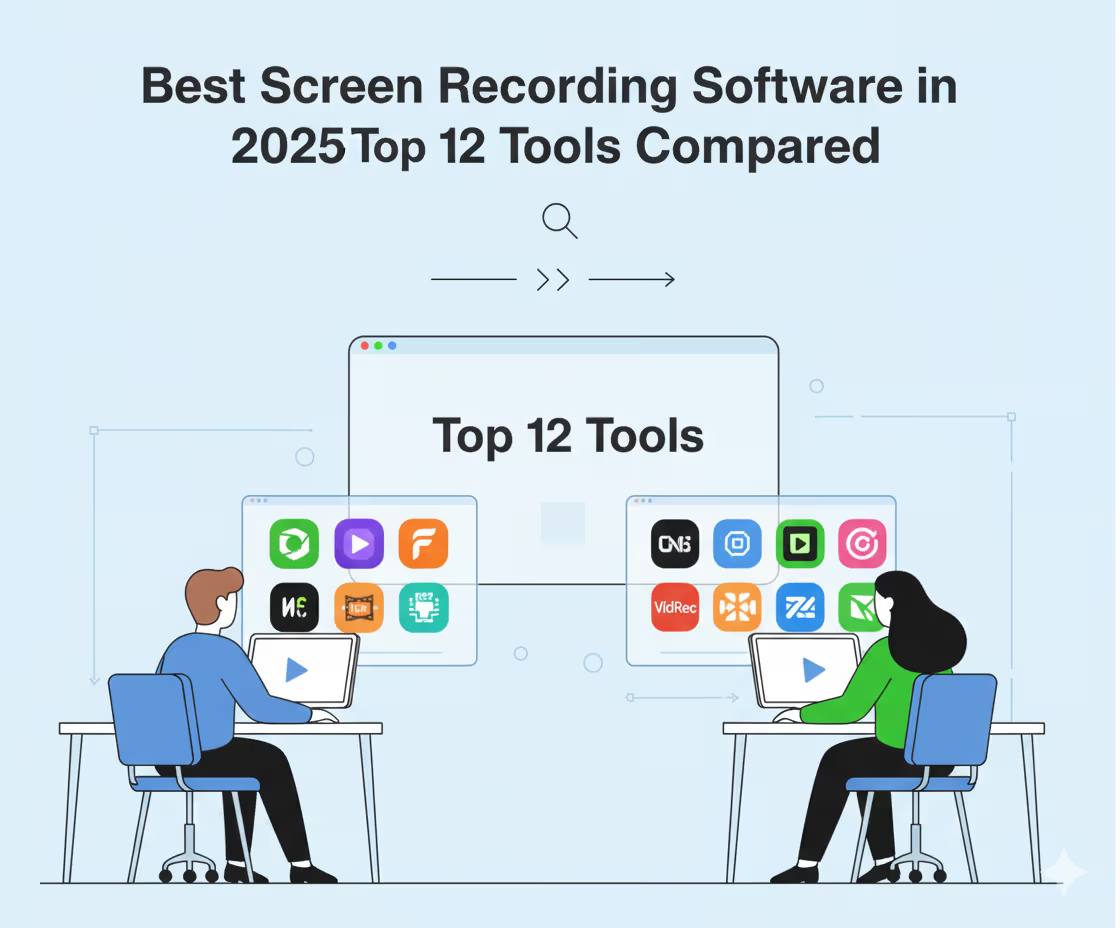
| Tool | Free | Price | Time Limit |
|---|---|---|---|
| Kommodo | ✓ | Free | ∞ |
| Loom | Limited | $15/mo | 5 min |
| OBS Studio | ✓ | Free | ∞ |
| Snagit | ✗ | $39/yr | ∞ |
| Camtasia | ✗ | $179/yr | ∞ |
| ScreenFlow | ✗ | $169 | ∞ |
| ShareX | ✓ | Free | ∞ |
| Bandicam | Trial | $36.95/yr | 10 min |
| Vimeo Record | Limited | $9/mo | 2 videos/mo |
| QuickTime | ✓ | Free | ∞ |
| Screencastify | Limited | $7/mo | 30 min |
| CloudApp | Limited | $9/mo | 90 sec |
The 12 Best Screen Recording Software Tools in 2025
Based on extensive testing, user feedback, and feature analysis, here are the top screen recording software options for 2025:
1. Kommodo — Best for Unlimited Recording 🏆
Kommodo offers unlimited screen recording on its free plan with no time limits, storage caps, or watermarks. The platform combines screen recording with AI-powered features designed for teams that create documentation and training content at scale.
What distinguishes Kommodo is its approach to searchability and documentation. The platform provides AI search across your entire video repository, making it easy to find specific moments across all recordings. Videos can be automatically converted into interactive guides that include embedded links and images, turning recordings into structured documentation. The platform emphasizes stability and performance, with a straightforward interface designed for quick adoption.
Key Features
- Unlimited free recordings with no time restrictions
- AI search across entire video repository to find specific content
- Interactive guides that automatically generate from recordings with embedded links and images
- AI-powered transcription for automatic captions and searchability
- Built-in video editor with trim, cut, and annotation tools
- Instant sharing with trackable links and viewer analytics
- Team collaboration with shared libraries and workspaces
- No watermarks on any plan
Pros
- Free plan with unlimited recordings (not a trial)
- AI search makes video libraries actually searchable
- Guides feature transforms videos into documentation
- Browser-based with no installation required
- Stable performance and fast rendering
- Clean, intuitive interface
Cons
- Free videos become locked after 60 days (require paid plan for access)
- AI features may have usage limitations on free tier
- Newer platform with fewer third-party integrations
Pricing
- Free: Unlimited recordings and storage, AI transcription and features (videos accessible for 60 days, AI features may be rate-limited)
- Premium ($15/mo or $9/mo billed annually): Permanent video access, unlimited AI usage, custom branding, collaboration tools, priority support
- Enterprise: Custom pricing with SSO (SAML/OIDC), SCIM provisioning, advanced security, and dedicated support
Best For
- Teams building video documentation libraries
- Product managers creating searchable tutorial content
- Customer support teams building help resources
- Organizations needing unlimited recording without cost barriers
- Teams that value searchability across video content
Our Take: Kommodo's strength lies in making video content searchable and reusable. The AI search and guide generation features address real pain points for teams managing large video libraries. The free plan offers unlimited recording, though videos require a paid plan to access after 60 days. This makes it well-suited for teams with active, recent content or those planning to upgrade for permanent access.
Watch Kommodo in action: Unlimited screen recording with AI-powered features
2. Loom — Best for Quick Async Videos

Loom pioneered the async video communication space and remains popular for quick screen recordings. With over 25 million users, it's become the default choice in many startups. The platform excels at fast, simple recordings that you can share instantly via link.
However, Loom's popularity has led to some compromises. The free plan's 5-minute recording limit can be restrictive for longer content, and at $15 per user per month (billed annually), costs can add up quickly for larger teams. Some newer alternatives offer unlimited recording on free plans for teams with different needs.
Key Features
- Chrome extension for one-click recording
- Instant shareable links with no processing time
- Emoji reactions and time-stamped comments
- AI-powered transcription and summaries
- Video chapters for easy navigation
- Basic trim and stitch editing
- Viewer analytics and engagement metrics
Pros
- Extremely fast to start recording
- Well-established with wide adoption
- Clean, minimalist interface
- Good for quick internal updates
- Strong integration ecosystem
Cons
- 5-minute limit on free plan severely restricts usage
- Watermark on all free recordings
- More expensive than newer alternatives
- Limited editing capabilities
- Performance issues with longer recordings
Pricing
- Starter (Free): 25 videos max, 5-minute limit, Loom watermark
- Business ($15/mo or $18/mo monthly): Unlimited videos and length, no watermark, billed annually or monthly
- Enterprise: Custom pricing with SSO and advanced admin controls
Best For
- Quick bug reports and feedback
- Short status updates
- Teams already invested in the Loom ecosystem
- Simple recordings that don't need editing
Our Take: Loom remains a solid choice for quick videos and has strong ecosystem integration. The 5-minute free limit works well for brief updates but may be restrictive for longer content. Consider your typical recording length when evaluating free tier options.
3. OBS Studio — Best Free Tool for Power Users
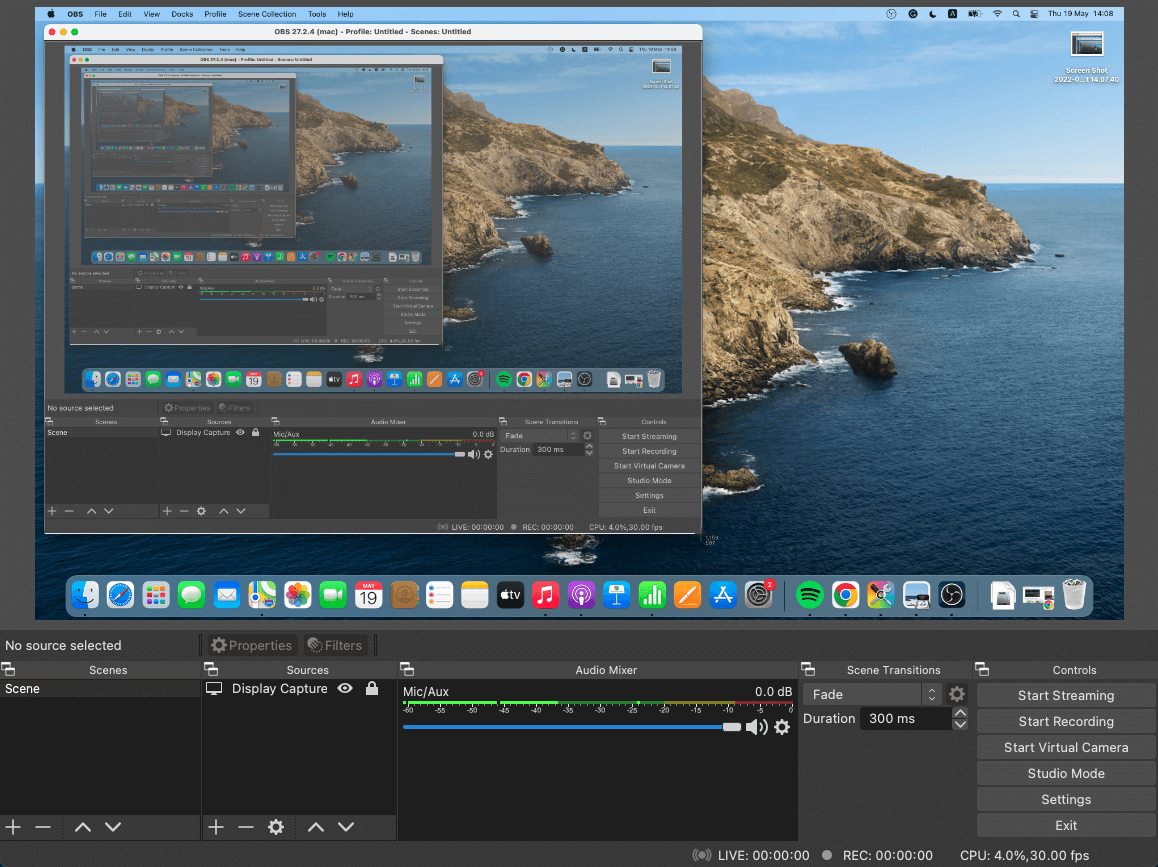
OBS Studio stands as the undisputed champion of free, open-source screen recording and live streaming. With unlimited recording, no watermarks, and incredible customization options, it's the choice of serious content creators, gamers, and technical users worldwide.
The trade-off? OBS has a steep learning curve. What takes one click in simpler tools might require configuring scenes, sources, and encoding settings in OBS. But for users who need total control and professional features without paying a cent, nothing beats it.
Key Features
- Unlimited recording with no restrictions
- Multiple scene compositions
- Advanced audio mixing with filters
- Plugin ecosystem for extended functionality
- Live streaming to multiple platforms simultaneously
- Hardware encoding support
- Virtual camera output
Pros
- 100% free and open-source forever
- No watermarks or limitations
- Incredibly powerful and customizable
- Active community and constant updates
- Cross-platform (Windows, Mac, Linux)
Cons
- Steep learning curve for beginners
- No built-in video editor
- No cloud hosting or sharing features
- Requires technical knowledge for optimization
- Can be overkill for simple recordings
Pricing
- Free (open-source, no paid tiers)
Best For
- Live streamers and content creators
- Users needing advanced customization
- Gaming and esports recording
- Technical professionals comfortable with complexity
- Anyone wanting unlimited free recording with full control
Our Take: OBS is unmatched for power users who need complete control and advanced features. The steep learning curve is the main trade-off. For simpler everyday recording needs, browser-based tools offer faster setup and easier workflows.
4. Snagit — Best for Screenshots + Simple Video
TechSmith's Snagit has been the go-to screenshot tool for professionals for over two decades. While primarily known for image capture, Snagit includes solid screen recording capabilities that make it a versatile choice for documentation and technical communication.
The strength lies in Snagit's screenshot features—scrolling capture, panoramic capture, and extensive annotation tools. The video recording feels more like an add-on, lacking the advanced features found in dedicated video tools. Starting at $39 per year for individual users, it's reasonably priced for screenshot work but expensive if you primarily need video recording. Note that Snagit 2025 transitioned to a subscription-only model.
Key Features
- Screenshot and video recording in one tool
- Scrolling capture for long webpages
- Extensive annotation library and templates
- Simple video trimming
- Favorites tool for quick access to frequent captures
- GIF creation from video
- OCR text capture from images
Pros
- Excellent screenshot capabilities
- Professional annotation tools
- One-time purchase option available
- Reliable and mature software
- Great for technical documentation
Cons
- Pricey for just screen recording ($39-48/year depending on plan)
- Basic video editing features
- No cloud hosting built-in
- Not optimized for long recordings
- Subscription-only for 2025 version (no perpetual license)
Pricing
- Individual: $39/year (subscription-only for Snagit 2025)
- Business: $48/user/year
- Education: $20/year for students
- Volume Licensing: Discounts for teams
- Note: Older perpetual licenses no longer available for 2025 version
Best For
- Technical writers and documentation specialists
- Support teams needing screenshot + video
- Users who primarily need screenshots with occasional video
- Creating visual instructions and tutorials
Our Take: Snagit excels at screenshots and is worth considering if you need both screenshot and video capabilities in one tool. For teams primarily focused on video recording, dedicated video tools may provide better value.
5. Camtasia — Best for Professional Video Editing
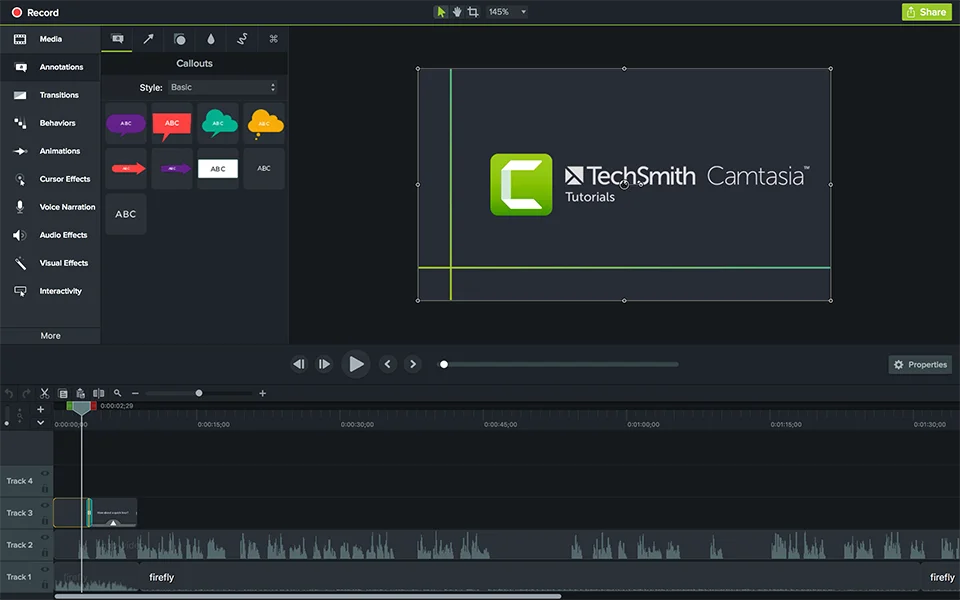
Camtasia represents TechSmith's professional-grade solution for screen recording and video editing. If you need to create polished training videos, online courses, or marketing content with professional effects and transitions, Camtasia delivers Hollywood-level capabilities.
The multi-track timeline editor, extensive effects library, and interactive quiz features make it ideal for educational content. However, at $179.88 per year, it's one of the most expensive options. The learning curve is also significant—this isn't a tool for quick recordings.
Key Features
- Professional multi-track video editor
- Library of animations, transitions, and effects
- Interactive quizzes and hotspots
- Green screen (chroma key) support
- Royalty-free music and sound effects library
- Cursor effects and highlights
- Batch production for multiple formats
Pros
- Industry-leading editing capabilities
- No watermarks or limits
- Extensive asset library included
- Perfect for e-learning content
- Professional output quality
Cons
- Expensive ($179-249/year depending on plan)
- Steep learning curve
- Overkill for simple recordings
- Large application size and resource usage
- Slower workflow for quick videos
- Subscription-only for 2025 version (no perpetual license)
Pricing
- Essentials: $179/year
- Create: $249/year (includes AI features)
- Camtasia + Audiate Bundle: $329.87/year
- Business: Volume pricing available
- Education: Significant discounts for schools
- Note: Camtasia 2025 transitioned to subscription-only model
Best For
- Professional training and course creators
- Marketing teams producing video content
- E-learning developers
- Anyone needing broadcast-quality output
Our Take: Camtasia justifies its price for professional content creators who need broadcast-quality output and advanced editing capabilities. The investment makes sense for course creators and marketing teams producing polished video content. Teams with simpler editing needs may find the cost and complexity unnecessary.
6. ScreenFlow — Best for Mac Power Users
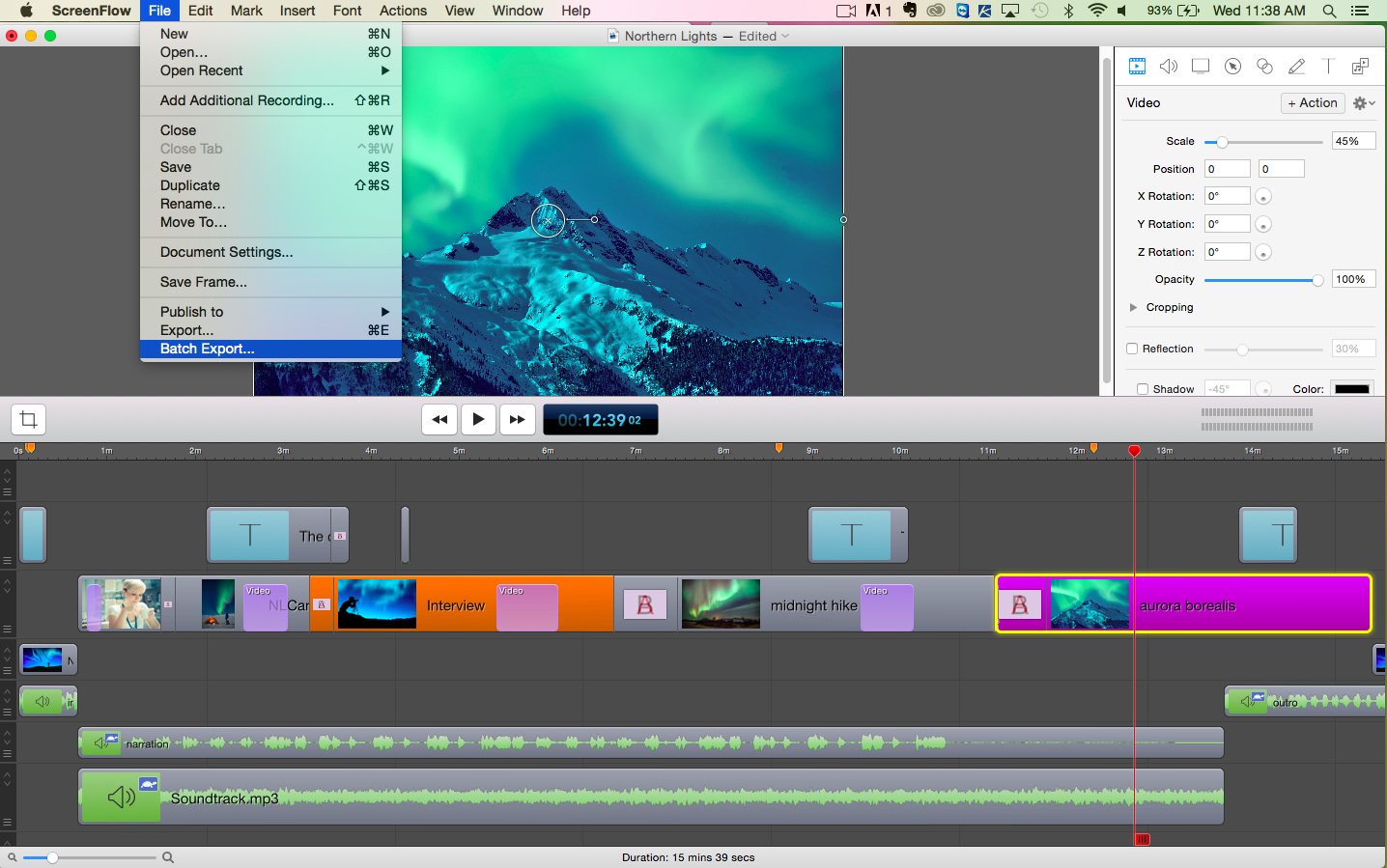
ScreenFlow is the Mac-exclusive screen recording and editing software that Apple users swear by. With native macOS optimization, it runs incredibly smooth and can even record iOS devices connected via USB—perfect for app demos and mobile tutorials.
The editing capabilities rival Camtasia, with multi-track editing, animations, and professional effects. The $169 one-time purchase feels reasonable for what you get, but being Mac-only limits its appeal for cross-platform teams.
Key Features
- Native Mac performance optimization
- iOS device recording via USB
- Professional multi-track editing
- Stock media library access
- Closed caption support
- Animated text and graphics
- Touch callouts for mobile demos
Pros
- Buttery smooth performance on Mac
- One-time purchase with free updates
- Can record iPhone/iPad screens directly
- Professional editing capabilities
- Excellent for app developers
Cons
- Mac only (no Windows or Linux)
- $169 upfront cost
- Learning curve for advanced features
- No built-in cloud sharing
- Limited collaboration features
Pricing
- Standard License: $169 one-time purchase
- Super Pak: $248 (includes 1-year stock media library access)
- Super Pak+: $287 (includes 1-year stock media library + priority premium support)
- Volume Discounts: Available for 5+ licenses
- Education Pricing: $129 for qualified institutions
Best For
- Mac-exclusive teams
- iOS app developers and designers
- YouTubers and content creators on Mac
- Professional video production on macOS
Our Take: ScreenFlow is excellent for Mac-only teams who need professional editing and iOS recording capabilities. The one-time purchase model is attractive compared to subscription-only alternatives. Cross-platform teams will need to consider alternatives that work on all operating systems.
7. ShareX — Best Free Tool for Windows
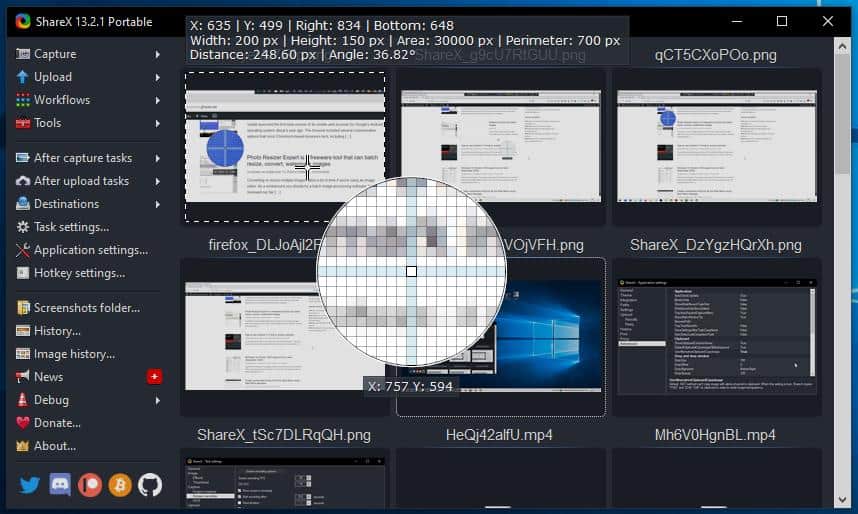
ShareX is the Swiss Army knife of screen capture for Windows users. This free, open-source powerhouse does everything: screenshots, screen recording, GIF creation, file sharing, and even OCR. With over 80 upload destinations and customizable workflows, it's incredibly powerful.
The interface feels dated compared to modern alternatives, and the sheer number of options can overwhelm new users. But for Windows power users who want maximum flexibility without spending a dime, ShareX is unmatched.
Key Features
- Screen recording, screenshots, and GIF capture
- Automated workflows and hotkeys
- 80+ upload destination options
- OCR text recognition
- QR code generation and scanning
- Custom capture regions
- Post-capture tasks automation
Pros
- 100% free and open-source
- Incredibly feature-rich
- No limitations or watermarks
- Highly customizable workflows
- Active development community
Cons
- Windows only
- Dated, complex interface
- Overwhelming number of options
- No built-in video editor
- Steep learning curve for beginners
Pricing
- Free (open-source, no paid options)
Best For
- Windows power users
- Technical professionals who love customization
- Users needing automated capture workflows
- Anyone wanting maximum features for free
Our Take: ShareX is outstanding for Windows power users who want maximum customization and automated workflows. The dated interface and complexity can overwhelm casual users. Those seeking simpler cross-platform tools should explore browser-based alternatives.
8. Bandicam — Best for Gaming Recording
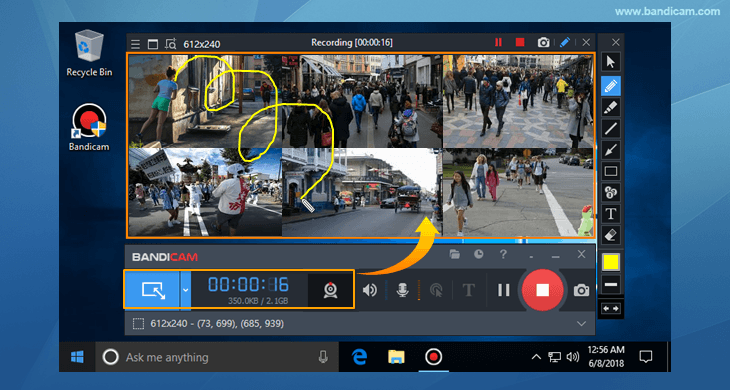
Bandicam specializes in high-performance game recording with minimal impact on gameplay. Supporting up to 480 FPS capture and 4K UHD resolution, it's the choice of serious gamers and gaming content creators who can't afford frame drops during recording.
The focus on gaming means Bandicam excels at performance but lacks features for business use. The 10-minute trial limit and prominent watermark make evaluation difficult, and at $39.95, there are more versatile options available.
Key Features
- High FPS recording (up to 480 FPS)
- Minimal CPU/GPU usage during gaming
- Hardware acceleration support
- Real-time drawing and annotations
- Webcam overlay for facecam
- Scheduled recording
- External device capture (Xbox, PlayStation, webcam)
Pros
- Excellent gaming performance
- Supports ultra-high frame rates
- 4K UHD recording
- Low system resource usage
- One-time purchase
Cons
- 10-minute trial limit with watermark
- Windows only
- Basic editing features
- Not ideal for non-gaming content
- Dated interface design
Pricing
- Free Trial: 10-minute limit with watermark
- Annual Subscription: $36.95/year
- Lifetime License (1-PC): $49.95 one-time
- Lifetime License (2-PC): $59.95 one-time
- Business License: Custom pricing
Best For
- Gaming content creators
- Let's Play video producers
- Game reviewers and streamers
- Recording console gameplay
Our Take: Bandicam excels at gaming recording with minimal performance impact. The tool is highly specialized for this use case. Teams needing versatile recording for both gaming and professional work should consider more general-purpose tools.
9. Vimeo Record — Best for Video Hosting Integration

Vimeo Record combines screen recording with Vimeo's premium video hosting platform. If you're already using Vimeo for video distribution, the integrated workflow from recording to hosting to sharing is seamless.
The free tier provides 1GB total storage with a limit of 2 video uploads per month. The real value comes with paid Vimeo plans starting at $9/month (billed annually) that include expanded storage, advanced privacy controls, custom players, and analytics.
Key Features
- Browser-based recording (no download)
- Direct upload to Vimeo platform
- Privacy and password controls
- Custom video player
- Team review and approval tools
- Basic trimming tools
- Viewer analytics
Pros
- Seamless Vimeo integration
- Professional video player
- Strong privacy options
- Generous storage on paid plans
- Clean, modern interface
Cons
- Limited free tier (1GB storage, 2 videos/month)
- Requires Vimeo account
- Paid plans start at $9/mo but full features require higher tiers ($25+/mo)
- Limited editing capabilities
- No desktop app option
Pricing
- Free: $0, 1GB total storage, 2 videos/month upload limit
- Starter: $9/mo (annual) or $12/mo (monthly), 100GB total storage
- Standard: $25/mo (annual) or $41/mo (monthly), 2TB total storage, brand kit, advanced editing, AI script generation
- Advanced: $65/mo (annual), 7TB total storage, all Standard features plus advanced analytics
Best For
- Existing Vimeo users
- Content creators needing professional hosting
- Teams requiring privacy controls
- Marketing teams with video distribution needs
Our Take: Vimeo Record makes sense if you're already using Vimeo for video hosting and distribution. The integrated workflow is the main selling point. Teams not already in the Vimeo ecosystem should compare hosting costs against standalone recording tools.
10. QuickTime Player — Basic but Free for Mac
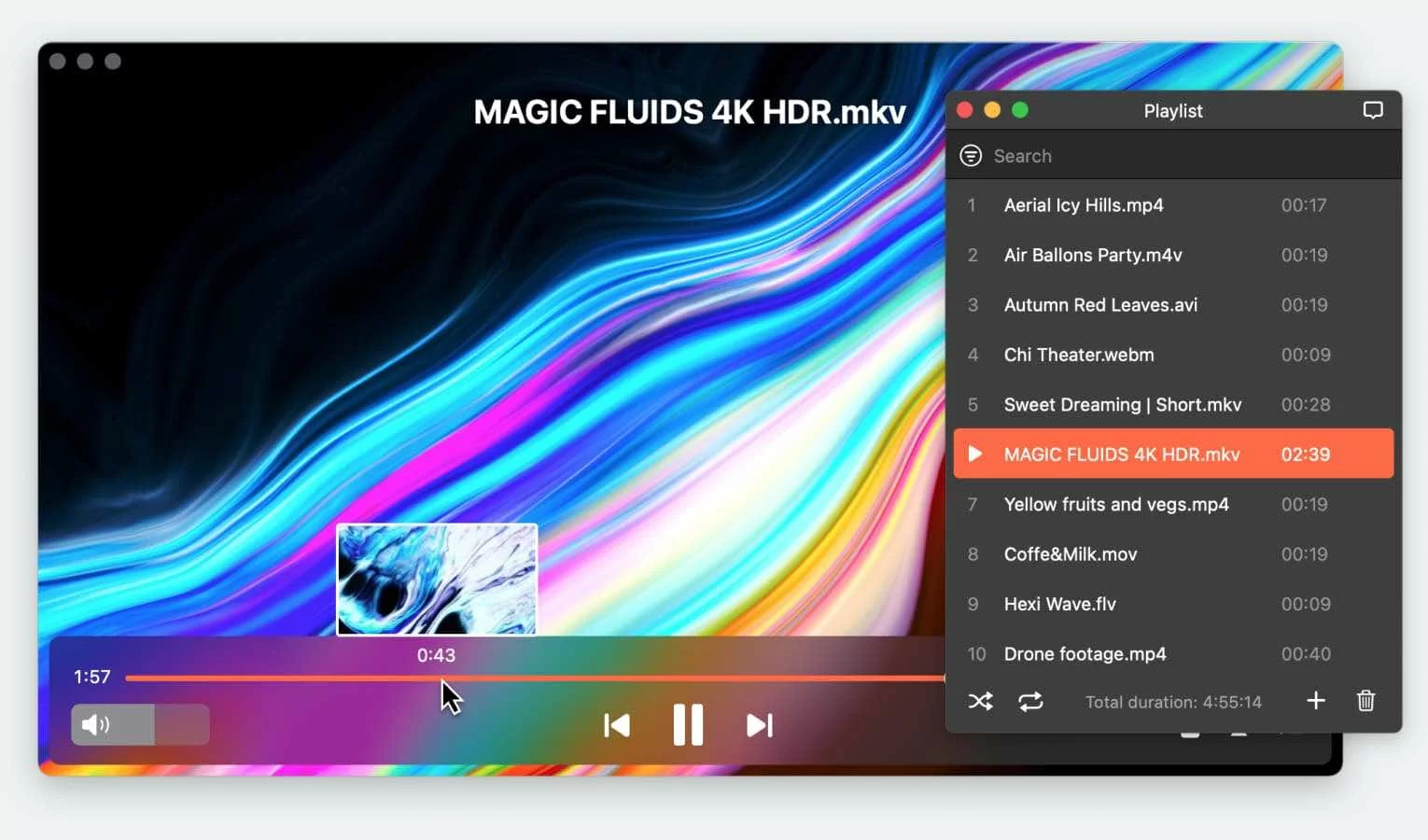
QuickTime Player comes pre-installed on every Mac, making it the most accessible option for Mac users. While extremely basic, it handles simple screen recording tasks without any setup, installation, or cost.
The simplicity is both QuickTime's strength and weakness. There's no editing beyond basic trimming, no annotations, no cloud sharing—just straightforward recording. For quick captures that you'll edit elsewhere, it works. For anything more, you'll need a real tool.
Key Features
- Built into macOS (no installation)
- Screen or window recording
- iOS device recording via cable
- Basic trim feature
- Audio recording
- Export to multiple formats
Pros
- Completely free
- Already installed on Mac
- No watermarks or limits
- Dead simple to use
- Reliable and stable
Cons
- Mac only
- Extremely basic features
- No editing capabilities
- No annotations or effects
- No cloud sharing
- Large file sizes
Pricing
- Free (included with macOS)
Best For
- Quick Mac screen captures
- Users who edit in other software
- Temporary recordings
- Absolute beginners on Mac
Our Take: QuickTime serves Mac users well for basic, quick recordings with zero setup. The lack of editing and sharing features becomes limiting for regular use. Consider dedicated recording tools if you create video content frequently.
11. Screencastify — Best for Education

Screencastify carved out a niche in education with deep Google Classroom integration and student-friendly features. Teachers love the simplicity, and the Chrome extension means it works on Chromebooks—critical for many schools.
The free plan allows up to 30-minute recordings and stores up to 10 videos, which is workable for occasional use but limiting for regular content creation. The limited AI features and watermark make it less practical for professional use. Starting at $7/month (billed annually), it's affordable for educators but lacks advanced features that business users expect.
Key Features
- Chrome extension (works on any OS)
- Google Drive auto-save
- Google Classroom integration
- Drawing tools during recording
- Student submission features
- Basic trim and crop editing
- Viewer questions and quizzes
Pros
- Perfect for education sector
- Works on Chromebooks
- Simple enough for students
- Affordable pricing
- Google ecosystem integration
Cons
- 30-minute limit per video on free plan (10 videos max storage)
- Limited AI features on free tier
- Watermark on free recordings
- Higher pricing on monthly billing ($19-25/mo vs $7-10/mo annual)
- Basic editing capabilities
- Chrome-dependent
Pricing
- Free: Up to 10 videos, 30-minute max per recording, limited AI features, watermark
- Starter ($7/mo annual or $19/mo monthly): Unlimited videos, 60-minute max per recording, unlimited AI features, captions, no watermark, video exports
- Pro ($10/mo annual or $25/mo monthly): Unlimited videos, 120-minute max per recording, all Starter features plus AI voice-overs and priority support
- Schools/Districts: Custom pricing available
Best For
- Teachers and educators
- Schools using Google Workspace
- Chromebook users
- Student projects and presentations
Our Take: Screencastify is well-suited for education with its Google Classroom integration and Chromebook support. The 30-minute free tier limit and 10-video storage cap are workable for occasional use. Annual pricing at $7/month for Starter is reasonable for educators, though the monthly rate of $19/month is significantly higher. Business users may find the feature set too basic for professional needs.
12. CloudApp — Best for Quick Visual Communication
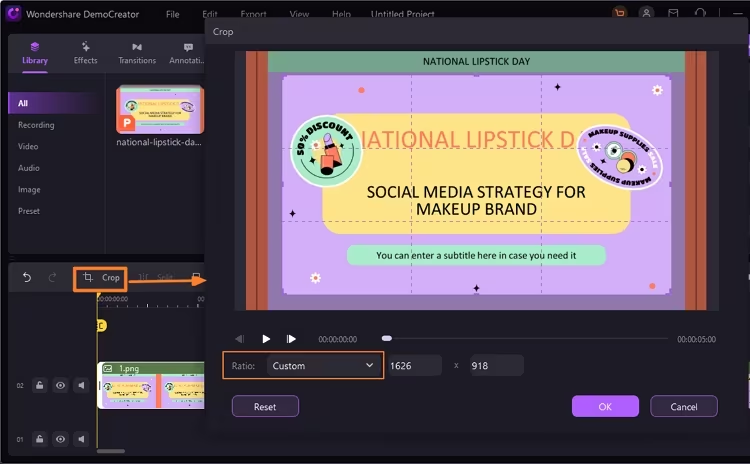
CloudApp (now Zight) focuses on ultra-fast visual communication—screenshots, GIFs, and short screen recordings that you can share instantly. The drag-and-drop simplicity and beautiful interface make it pleasant to use.
However, the 90-second recording limit on the free plan severely restricts video use. While paid plans offer unlimited recording time, the pricing feels steep for what is primarily a screenshot and GIF tool with screen recording as a secondary feature.
Key Features
- Instant screenshots and screen GIFs
- 90-second screen recordings (free)
- Drag-and-drop sharing
- Annotation tools
- Custom short links
- Team workspaces
- Analytics on shared content
Pros
- Extremely fast workflow
- Beautiful, modern interface
- Great for visual bug reports
- Strong annotation tools
- Good Slack integration
Cons
- 90-second limit on free plan (severely restricts video use)
- 25 drops per month limit on free plan
- Pricing feels steep for primarily a screenshot/GIF tool
- Focus on screenshots and GIFs over video recording
- Limited editing capabilities
- 15-second maximum for GIFs on free plan
Pricing
- Free: Limited screen recording and screenshot capabilities
- Pro ($9/mo): Unlimited recording time, unlimited drops, individual professional features
- Team ($10/user/mo): Unlimited recording, team collaboration features, multiple users
- Business ($19/user/mo): Advanced features for larger teams, enhanced security and support
Best For
- Quick visual bug reports
- Screenshot-heavy workflows
- Brief visual feedback
- Teams prioritizing speed over features
Our Take: CloudApp (now Zight) excels at screenshots and GIFs for quick visual communication. The limited free tier restricts video recording capabilities, though paid plans starting at $9/month offer unlimited recording time. The pricing structure scales from individual Pro ($9/mo) to Business ($19/user/mo), making it reasonable for screenshot-heavy workflows but potentially steep for teams primarily focused on video recording.
How to Choose the Right Screen Recording Software for Your Needs
With 12 excellent options available, how do you pick the right one? Let's break it down by use case and requirements.
Consider Your Primary Use Case
For Education and Training: If you're creating tutorials or course content, you need clear audio, annotation tools, and the ability to record longer sessions. Camtasia offers the most professional editing features, while Kommodo provides unlimited recording with AI transcription—perfect for creating searchable training libraries. Screencastify works well for teachers using Google Classroom.
For Gaming and Streaming: Performance is paramount. OBS Studio gives you complete control over your streaming setup, while Bandicam minimizes performance impact during gaming. Both support high frame rates and multiple audio sources.
For Quick Team Updates: Speed matters more than features. Loom pioneered this space with one-click recording, but Kommodo offers the same simplicity without time limits. Both provide instant sharing links and viewer analytics.
For Professional Demos: You need polish and branding. Camtasia and ScreenFlow offer broadcast-quality editing, while Kommodo balances professional features with ease of use. All three support custom branding and high-quality output.
Evaluate Your Budget
Free Forever Options:
- Kommodo: Unlimited recordings, no watermarks, AI features
- OBS Studio: Unlimited everything, but complex
- ShareX: Feature-rich but Windows only
- QuickTime: Basic but reliable on Mac
Under $10/month:
- Screencastify Starter ($7/mo annual): Good for education
- CloudApp Pro ($9/mo): Better for screenshots than video
Under $20/month:
- Loom ($15/mo or $18/mo monthly): Popular but limited free tier
- Vimeo Record Starter ($9/mo annual or $12/mo monthly): Includes 100GB hosting
- Kommodo Premium ($15/mo or $9/mo annually): Unlimited AI features, permanent video access
Subscription or One-Time Purchase:
- Snagit ($39/yr): Screenshot focus (subscription-only for 2025)
- Camtasia ($179-249/yr): Professional editing (subscription-only for 2025)
- ScreenFlow ($169): Mac only (one-time)
- Bandicam ($36.95/yr or $49.95 lifetime): Gaming focus
Check Recording Limits
This is where many tools reveal their true colors:
No Limits Needed? Kommodo, OBS Studio, and the paid versions of most tools offer unlimited recording. QuickTime and ShareX also have no limits.
Occasional Short Videos (Under 5 minutes)? Even Loom's restrictive free plan might work, though why accept limits when Kommodo is free?
Moderate Sessions (Under 30 minutes)? Screencastify and Vimeo Record free plans work here.
Avoid These: CloudApp's 90-second limit and Loom's 5-minute limit feel increasingly outdated in 2025.
Platform Compatibility Matters
Need Cross-Platform?
- Browser-based: Kommodo, Loom, Vimeo Record
- Desktop apps: OBS Studio (Win/Mac/Linux), Camtasia (Win/Mac)
Mac Only? ScreenFlow and QuickTime are your platform-exclusive options.
Windows Only? ShareX and Bandicam are Windows-exclusive but excellent in their niches.
Chromebook? Screencastify was built for this, though any browser-based tool works.
Best Screen Recorder for Windows
Windows users have excellent options across all price points. ShareX leads the free category with extensive features and automation, though it has a steeper learning curve. OBS Studio provides professional-grade recording and streaming capabilities. For paid options, Camtasia offers the best editing suite, while Bandicam excels for gaming. Kommodo works great as a browser-based solution that requires no installation.
Best Screen Recorder for Mac
Mac users can choose between native apps and browser tools. QuickTime comes pre-installed and handles basic recording well. ScreenFlow ($169) provides professional features optimized for macOS and iOS recording. For free options, OBS Studio offers maximum control. Kommodo works seamlessly in the browser, providing unlimited recording without installation.
Best Free Screen Recorder
Several tools offer genuinely useful free tiers. Kommodo provides unlimited recording time and storage with no watermarks, plus AI features (videos accessible for 60 days). OBS Studio is completely free with unlimited everything, ideal for streamers and power users. ShareX (Windows) and QuickTime (Mac) are platform-specific free options. Avoid tools with severe restrictions like Loom (5-minute limit) or CloudApp (90-second limit).
Best Screen Recorder for Gaming
Gaming requires high performance and minimal system impact. OBS Studio dominates for game streaming with support for 480+ FPS and multiple platforms. Bandicam minimizes performance impact with hardware acceleration. Both support high frame rates and external device capture for console gaming. Kommodo and other business-focused tools lack gaming-specific optimizations.
The Future of Screen Recording in 2025
The screen recording landscape continues to evolve rapidly. Here's what's shaping the industry:
AI Integration Becomes Standard
AI transcription has become standard across platforms. Leading tools are advancing with AI-powered editing, automatic chapter generation, and content suggestions. Transcript-based editing—where you edit video by editing text—represents an emerging approach that simplifies the editing workflow.
Unlimited as the New Normal
The era of artificial limits is evolving. As storage costs decrease and competition increases, some platforms are offering more generous free tiers. This shift reflects changing market dynamics and user expectations for screen recording tools.
Specialization vs. All-in-One
Two divergent strategies are emerging: specialized tools that excel at specific use cases (Bandicam for gaming, Screencastify for education) versus comprehensive platforms that integrate recording, editing, and distribution. Users should consider whether they need a focused tool or an all-in-one platform based on their workflow.
Privacy and Security Focus
With remote work permanent, enterprise security requirements are filtering down to smaller tools. Expect more emphasis on encryption, access controls, and compliance features across all platforms.
Frequently Asked Questions
What is the best free screen recording software?
Several tools offer strong free options depending on your needs. Kommodo provides unlimited recordings with no time limits or watermarks, along with AI search and guide features. OBS Studio is excellent for power users who need advanced customization and streaming capabilities. ShareX serves Windows users who want extensive automation options. QuickTime works for basic Mac recording needs.
Try Kommodo's free unlimited plan
Is there screen recording software with no time limit?
Yes! Several tools offer unlimited recording time. Kommodo provides unlimited recording on both free and paid plans. OBS Studio is completely free with no limits. Camtasia, Snagit, and ScreenFlow have no limits but require payment. Most free plans from other tools impose limits—Loom restricts you to 5 minutes, Screencastify to 10 minutes, and CloudApp to just 90 seconds.
Can I record my screen for free?
Absolutely! Many excellent screen recording tools offer free options. Kommodo provides unlimited recordings with no time limits or watermarks completely free. OBS Studio is open-source and free forever. QuickTime comes built into every Mac. ShareX is free for Windows users. Just be aware that some "free" tools like Loom and Screencastify impose severe restrictions that make them impractical for regular use.
What screen recorder do YouTubers use?
Most YouTube content creators use OBS Studio for its advanced features, unlimited recording, and live streaming capabilities. It's free, supports multiple scenes and sources, and can stream directly to YouTube. Gaming YouTubers often prefer Bandicam for minimal performance impact during gameplay. For tutorial creators, Camtasia is popular for its professional editing suite. Budget-conscious creators increasingly choose Kommodo for unlimited recording with built-in editing features.
Does Windows 10/11 have a built-in screen recorder?
Yes! Windows 10 and 11 include the Xbox Game Bar (press Win + G) which can record your screen for free. However, it has significant limitations: it can't record File Explorer or the desktop, only individual application windows. The recording quality and features are basic compared to dedicated tools. For professional use, consider Kommodo for cross-platform recording or ShareX for a powerful Windows-specific solution.
Can I record my screen and webcam at the same time?
Yes! Most modern screen recording software supports simultaneous screen and webcam capture. Kommodo, Loom, OBS Studio, Camtasia, and Vimeo Record all offer webcam overlay features. This is essential for creating engaging tutorials, product demos, or personalized messages where viewers benefit from seeing both your screen and your face. Kommodo makes this particularly easy with automatic picture-in-picture positioning.
How do I remove the watermark from my screen recordings?
You have three options for watermark-free recordings. First, use tools that don't add watermarks on free plans: Kommodo, OBS Studio (free and open-source), or ShareX (Windows, free). Second, upgrade to paid plans on tools like Loom ($15/mo) or Screencastify ($7/mo annual). Third, consider one-time purchases like ScreenFlow ($169) or Camtasia ($179-249/yr). Compare free tier limitations against your recording needs to find the best fit.
What's better: Desktop app or browser-based recording?
It depends on your needs. Desktop apps like Camtasia, ScreenFlow, and OBS offer more powerful features, better performance, work offline, and provide more control over recording settings. Browser-based tools like Kommodo, Loom, and Screencastify require no installation, start recording faster, work across platforms, and include built-in cloud storage. Consider your workflow: desktop apps for advanced editing and offline work, browser-based for quick setup and cross-platform teams.
Can I edit my screen recordings?
Yes, but capabilities vary widely. Advanced editing with effects, transitions, and multi-track timelines is available in Camtasia and ScreenFlow. Basic editing like trimming and simple annotations is offered by Kommodo, Loom, Screencastify, and Vimeo Record. Some tools like OBS Studio, QuickTime, and ShareX provide no editing features—they're recording-only. Choose based on your editing needs: professional tools for complex projects, integrated editors for quick polish.
Is screen recording legal?
Yes, recording your own screen is perfectly legal. However, be careful when recording video calls—always get consent before recording Zoom, Teams, or Google Meet sessions. Don't record copyrighted content from streaming services like Netflix or Hulu. Avoid capturing sensitive information like passwords, credit card numbers, or private data. Check your company's policies before recording workplace content. Most screen recorders, including Kommodo, include features to blur sensitive information for privacy protection.
Conclusion: Which Screen Recording Software Should You Choose?
After extensive testing and analysis, here's our verdict for 2025:
For most teams and individuals: Kommodo offers a strong balance of features and value. The free plan includes unlimited recordings without watermarks, plus AI search and guide generation for managing video libraries. The interface is straightforward, making it accessible for teams that need to create searchable documentation.
For power users and streamers: OBS Studio remains unmatched for complete control and customization. If you're willing to climb the learning curve, the payoff is enormous—and it's completely free.
For professional content creators: Camtasia (Windows/Mac) or ScreenFlow (Mac) justify their higher prices with broadcast-quality editing capabilities. These are investments in professional tools that pay dividends in polished output.
For specific niches: Screencastify owns the education space with Google Classroom integration. Bandicam excels for gaming. ShareX satisfies Windows power users. Choose based on your specific needs.
The Bottom Line:
Whether you're creating tutorials, recording meetings, or building a video knowledge base, focus on three key requirements:
- Easy recording that doesn't interrupt your workflow
- Sufficient editing to polish your message
- Instant sharing to reach your audience
Multiple tools now offer these capabilities across different price points and feature sets. Consider your specific needs—recording frequency, editing requirements, search functionality, and team collaboration—when making your choice.
Pricing information verified as of October 2025. Prices are subject to change. Please check official product websites for current pricing.
About the author

Related Articles

The Art of Saying No in 2024: Polite Ways to Decline a Meeting Request
Learn how to politely decline a meeting request in 2024 without being rude. Discover effective strategies for hybrid workers to protect their time while staying connected with their team.

15 Best Free Screen Recorders with No Time Limit (2025 Comparison)
Stop paying for screen recording. We tested 15 truly free tools - most "free" recorders have hidden limits. Find the best unlimited screen recorder with no watermarks, no time caps. Updated 2025.

7 Best Screencasting Software Tools in 2025 (Free & Paid)
Compare the top 7 screencasting tools in 2025. See detailed feature comparisons, honest reviews, and pricing to find the perfect screen recording software for your team.

